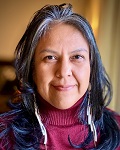2021
Rachael Nez

Dissertation Abstract
"Performative Models for Heritage Language Learning: Theater, Song and Tribal Radio"
Performance models for language learning are ones that are realized through the engagements of song, theater and tribal radio. In this research I provide insight into the heritage language movement and demonstrate the need for song and theatrical performance as integral parts of heritage language maintenance. How do song, dialogues and theatrical performance support heritage language learning? How do western methods of language teaching limit heritage language learning?
With research methods grounded in Native American Studies scholarship and Diné epistemology, I propose and share examples of three performative language learning models: a Song and Dialogue Performance Model, a Theatrical Performance Model, and a Tribal Radio Model. I argue that with the inclusion of songs, singing, and movement, language learning can continue beyond the curriculum and outside of educational spaces, providing generations of Indigenous knowledge, stories, and language.
Through community-engaged research, and multimedia filmmaking Diné bizaad, Nisenan language and Quechua language demonstrate how song and movement enhance heritage languages in powerful ways that overcome the restrictions of Western, classroom-based curricula. This dissertation aims to spark a discussion about the importance of adding more song, dialogues, dance, and theater to Native community programming and school curricula for language learning and maintenance. It challenges both academic and Native communities to consider performative approaches to language learning.
Performance models for language learning are ones that are realized through the engagements of song, theater and tribal radio. In this research I provide insight into the heritage language movement and demonstrate the need for song and theatrical performance as integral parts of heritage language maintenance. How do song, dialogues and theatrical performance support heritage language learning? How do western methods of language teaching limit heritage language learning?
With research methods grounded in Native American Studies scholarship and Diné epistemology, I propose and share examples of three performative language learning models: a Song and Dialogue Performance Model, a Theatrical Performance Model, and a Tribal Radio Model. I argue that with the inclusion of songs, singing, and movement, language learning can continue beyond the curriculum and outside of educational spaces, providing generations of Indigenous knowledge, stories, and language.
Through community-engaged research, and multimedia filmmaking Diné bizaad, Nisenan language and Quechua language demonstrate how song and movement enhance heritage languages in powerful ways that overcome the restrictions of Western, classroom-based curricula. This dissertation aims to spark a discussion about the importance of adding more song, dialogues, dance, and theater to Native community programming and school curricula for language learning and maintenance. It challenges both academic and Native communities to consider performative approaches to language learning.

